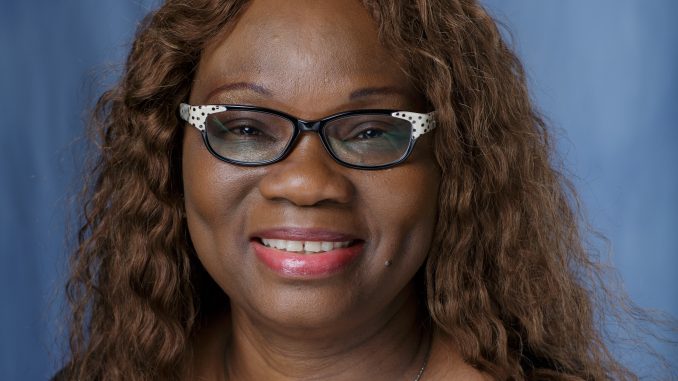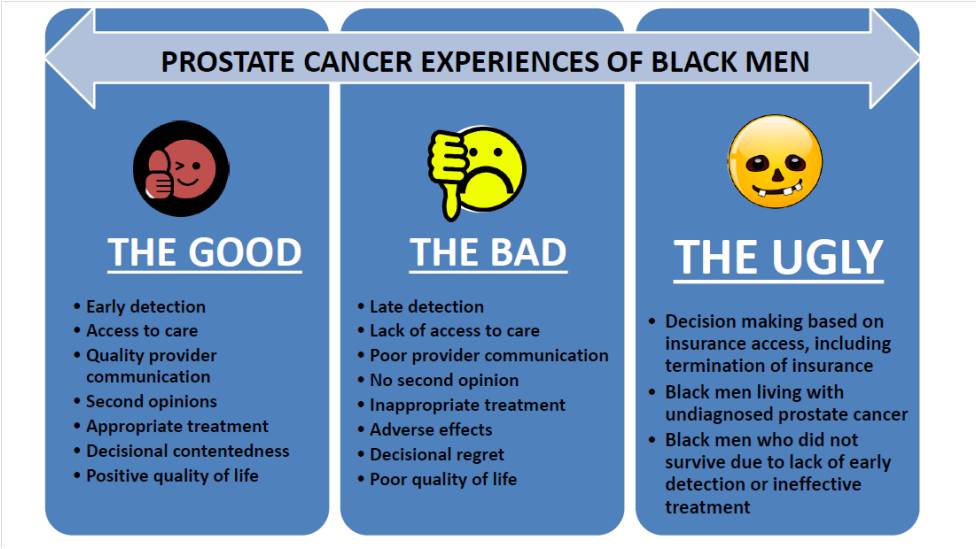
By Dr. Folakemi Odedina – Mayo Clinic Florida/Assoc. Director, Center for Health Equity and Community Engagement Research (CHCR) / Director, CHCR Global Health Disparities Initiatives.
** This study was funded by the Department of Defense Prostate Cancer Research Program of the office of the Congressionally Directed Medical Research Programs (Award W81XWH-13-1-0473).
Why did we do the study? On average, about 30,000 Black men will hear the words “You have prostate cancer” annually and over 5,000 Black men will die of prostate cancer annually. The good news is that deaths from prostate cancer has dropped to about half in Black men since 1993. The bad news is that Black men continue to be affected by prostate cancer compared to any other racial or ethnic group. Fighting prostate cancer in the Black community is difficult because many factors contribute to the problem. To conquer prostate cancer, we will need to pull together all our knowledge, experiences, and resources and include all stakeholders. Of significant importance is our knowledge of the prostate cancer experiences of Black men.
What was the goal of the study? With funding from the US Department of Defense, our research team set out to study Florida Black prostate cancer survivors in order to explain the experiences of Black men across the prostate cancer care continuum, including prostate cancer prevention, screening, detection, treatment and survivorship. Our goal was to develop what we call the prostate cancer care and survivorship (CaPCaS) model.
How did we conduct the study? Using the principles of community engagement research (equal partnership with the community), we interviewed Black prostate cancer survivors to document their experiences using audio and video recordings. Participants were US-born Black men, African-born Black men and Caribbean-born Black men in Florida. First, we identified 1,813 Black men diagnosed with prostate cancer from the Florida Cancer Data System. Second, we selected up to 212 Black men to be considered for the study. A majority of the participants were between 60 and 69 years (48.2%), had only high school diploma (26.1%), and married (65.3%). Relative to ethnicity, 67% of participants classified themselves as African-American of American origin (born and grew up in America), 20% as African-American of Caribbean origin (born in one of the Caribbean Islands but now American), 4% as Caribbean, 3.5% as African-American of African origin (born in Africa but now American), 0% as African, and 5.5% as Other/Don’t know/Refused. For the Black men who were born in the Caribbean Island, the most common countries of birth were Jamaica, Haiti and Guyana, respectively. Majority of the Black men who were born in Africa were born in Nigeria.
What did we find? For the one-on-one interviews, we selected a total of thirty-two prostate cancer survivors across Florida to participate in the study. In partnership with our Community Advisory Board members, our research team used the interview transcripts to develop themes from the data. The experiences of the Black prostate cancer survivors were divided into “the good” (e.g. timely diagnosis, excellent provider relationships, informed decision making, effective treatment, no decisional regret) and “the bad” (delayed diagnosis, poor provider relationships, inappropriate decision making, less effective treatment, decisional regrets). Results were presented at several community forums for validation where participants were presented with preliminary findings and asked to provide feedback to the team. At one of these events, a Black prostate cancer survivor stated that while we know a lot about the “good” and the “bad” experiences, we did not know about the “ugly.” He defined “the ugly” as the fact that we know little about Black men who did not enroll in the study – men who may be the most vulnerable to health disparities due to lack of access to screening, physical debility, or death due to prostate cancer. We added the “ugly” to the overall experience model (see figure).
What are our next steps based on what we found? Knowledge is power. From our study, we have identified what we need to do to improve the prostate cancer experiences of Black men and ultimately improve their prostate cancer care outcomes. We are now developing culturally responsive, tailored, targeted, and sustainable intervention programs to educate and improve the prostate cancer care and survivorship process experienced by Black men.
Study team members. Dr. Folakemi T. Odedina, Dr. Mary Ellen Young, Dr. Deidra Pereira, Dr. Getachew Dagne, Dr. Christopher Williams, Mr. Kenneth Stokes (late), Ms. Parisa Fathi, Ms. Nissa Askins, Dr. Jennifer Nguyen, Dr. Ernest Kaninjing and Ms. Eva Egensteiner.
Community advisory board members. Dr. Angela Adams, Prince. Oladapo Odedina, Mr. James West (late), Mr. Samuel Gaddy, Rev. Afolabi Ehikioya, Mr. Larry Pierre, Mr. Charles Griggs, Pastor Zacch Olorunnipa and Mr. Joey Johnson.
Acknowledgements. We value the priceless contributions of all the study participants who allowed us to walk with them in their prostate cancer journey.
About Dr. Folakemi Odedina. Dr. Odedina is the Mayo Clinic Florida Site Director for the Center for Health Equity and Community Engagement Research (CHCR), and Director of CHCR Global Health Equity Initiatives. In addition, she is the Founder and Program Director of the Prostate Cancer Transatlantic Consortium (CaPTC) and the Research Core Director for the Florida Health Equity Research Institute. For almost 30 years, her research, education, training and community outreach activities have exclusively focused on addressing health disparities in minority and underserved communities globally. She is personally and professionally committed to eliminating cancer disparities, especially in Black populations globally.

Contact Information. To partner with us, please send an email to CHECER@mayo.edu .
Figure. Prostate Cancer Experiences of Black Men: The Good, The Bad and The Ugly

Be the first to comment